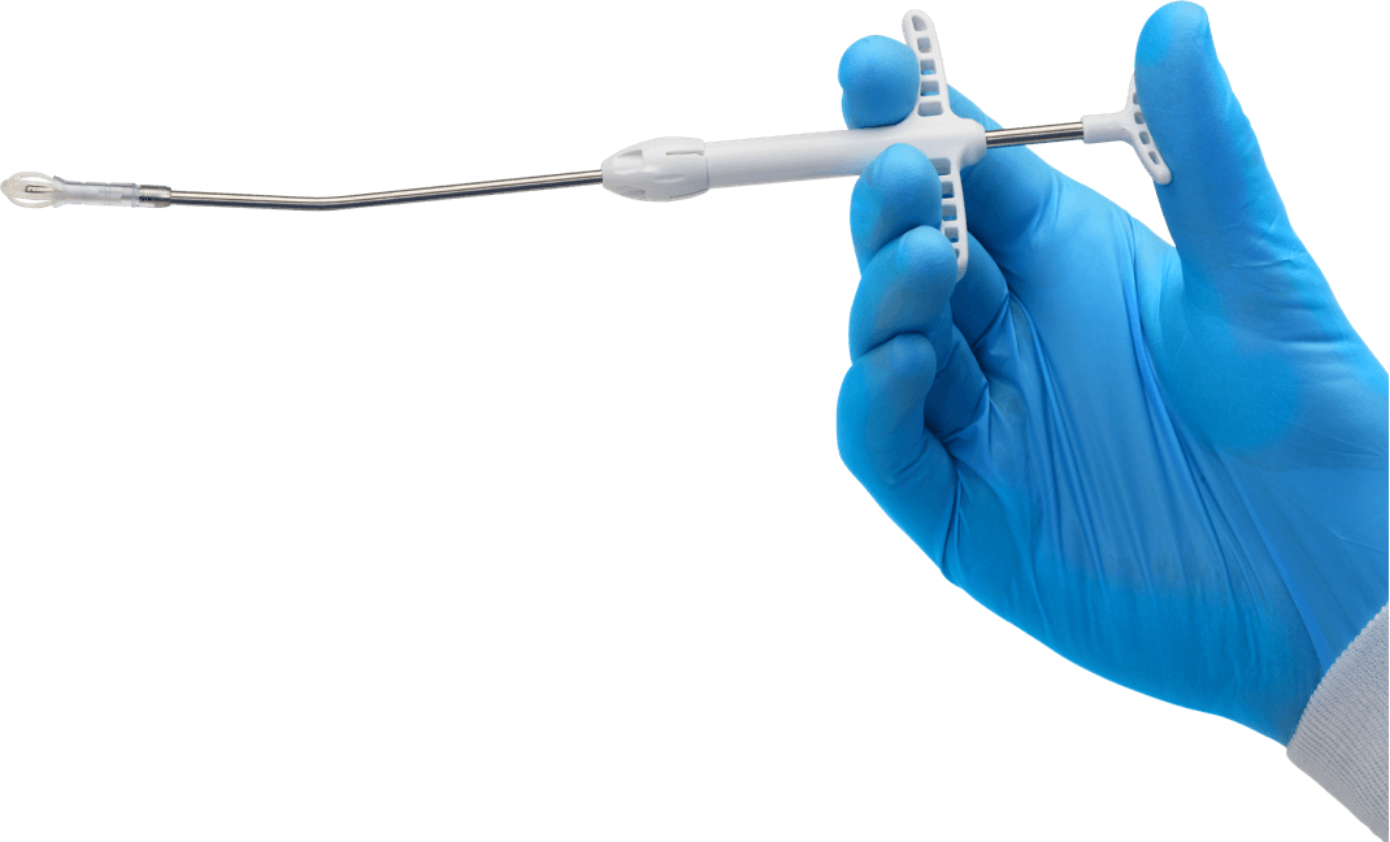SINUVA, a nonsurgical targeted nasal polyp treatment option
The first and only FDA-approved stent for the treatment of nasal polyps for adults who have had ethmoid surgery
DISCOVER RELIEF, THE SINUVA WAY.
What is SINUVA?
Discovering relief with SINUVA
SINUVA is an option for the treatment of nasal polyps that’s been shown to provide effective relief, compared to daily steroid nasal spray† alone in a clinical trial with 300 patients.‡
Proven to shrink nasal polyps
Reduced sinus obstruction and improved impaired sense of smell
Reduced symptoms of nasal obstruction and congestion for up to 90 days
Treatment with SINUVA resulted in fewer patients still needing sinus surgery§
† Mometasone furoate nasal spray.
‡ SINUVA was studied in a clinical trial with 201 patients who received SINUVA and daily steroid nasal spray, and 99 patients who were given daily steroid nasal spray alone. All patients were indicated for revision endoscopic sinus surgery at enrollment.
§ About 6 out of 10 patients treated with SINUVA and daily steroid nasal spray no longer needed repeat sinus surgery after 90 days compared to about 4 out of 10 patients treated with daily steroid nasal spray alone.
See How it Works
Targeted delivery of mometasone furoate over the course of 90 days
SINUVA is not a surgery; it’s a stent inserted into the ethmoid sinus cavity through the nasal opening during a routine office visit using local anesthesia and delivers anti-inflammatory medication right to the nasal polyps
See how SINUVA works

* The safety of SINUVA was established in 400 patients in 2 clinical trials.
SINUVA has a proven safety profile*
Because SINUVA is placed directly amongst the nasal polyps, it is able to provide targeted symptom relief that is sustained up to 90 days, with a low rate of side effects.
SINUVA demonstrated similar local effects and hypersensitivity reactions compared to daily steroid nasal spray, with a low incidence of serious side effects.
See important safety information.
The rates of adverse reactions observed, were similar between SINUVA and patients treated with daily steroid nasal spray.
The most common side effects were asthma, headache, and nose bleed. The most common side effects observed (in more than 1% of subjects and that occurred more frequently in patients who received SINUVA compared to patients who were given daily steroid nasal spray) in clinical studies were bronchitis, upper respiratory or middle ear infection, headache, lightheadedness, asthma, and nose bleed.
Nasal Polyps come back in 1 out of 3 patients at 6 months after sinus surgery.

Even though sinus surgery helps remove nasal polyps, sinus surgery is not a cure and your nasal polyps may pop up again. In fact, it’s common for nasal polyps to come back and require additional treatments.
Learn more about nasal polyps
Access &
Reimbursement
Many insurance policies will cover SINUVA.
Check with your insurance provider to ensure that your treatment plan is covered under their policy.
INDICATION
SINUVA Sinus Implant is a prescription steroid-releasing implant indicated for the treatment of chronic rhinosinusitis with nasal polyps in adult patients 18 years or older who have had ethmoid sinus surgery.
IMPORTANT SAFETY INFORMATION
Who should not use SINUVA?
Do not use SINUVA if you are allergic to mometasone furoate or any ingredients of the implant.
What should I tell my doctor before receiving SINUVA?
Before you receive SINUVA, tell your doctor about all medical conditions you have including nasal/sinus problems (such as nasal ulcers or trauma), eye problems (such as glaucoma or cataracts), or any untreated fungal, bacterial, or viral infections.
What are the possible side effects of SINUVA?
Serious side effects of SINUVA can include:
-
Local nasal adverse reactions including nosebleed and injury to nerves or blood vessels in the nose/sinus.
-
Serious allergic reactions have happened in patients using mometasone furoate including rash, itching or swelling of the lips, face, tongue, and throat, and breathing problems. Call your doctor right away if you have any of these reactions.
-
Weakened immune system that may increase your risk of infections. Avoid contact with people who have contagious diseases such as chickenpox or measles. Call your doctor right away if you have been near someone with chickenpox or measles.
-
Adrenal insufficiency is a condition in which the adrenal glands do not make enough steroid hormones and can cause tiredness, weakness, nausea and vomiting and low blood pressure. Talk to your doctor if steroid effects such as Cushing Syndrome and adrenal suppression appear.
The most common side effects of SINUVA in clinical studies were bronchitis, cold symptoms, middle ear infections, headache, lightheadedness or dizziness, asthma, and nosebleeds. The following side effects have been identified during post-approval use of the SINUVA sinus implant. These events include implant migration, lack of efficacy, nasal pain, headache, and nosebleeds.
Tell your doctor if you have any side effects that bother you or don’t go away.
Risks related with the insertion and removal of SINUVA are similar to other endoscopic sinus procedures.
SINUVA is made from materials designed to soften over time and may fall out of the nose on its
own as polyps decrease or if you sneeze or blow your nose forcefully. The implant will be removed 90 days after placement or earlier at your doctor’s discretion.
Contact your doctor immediately if you have any changes in vision, excessive nasal bleeding, symptoms of infection or symptoms suggesting that the implant has moved, such as irritation or a choking sensation in the back of the throat.
You are encouraged to report negative side effects of prescription drugs to the FDA. Visit www.fda.gov/medwatch, or call 1-800-FDA-1088.
For important risk and use information, please see Full Prescribing Information for SINUVA.
Indication and Important Safety Information
See MoreINDICATION
SINUVA Sinus Implant is a prescription steroid-releasing implant indicated for the treatment of chronic rhinosinusitis with nasal polyps in adult patients 18 years or older who have had ethmoid sinus surgery.
IMPORTANT SAFETY INFORMATION
Who should not use SINUVA?
Do not use SINUVA if you are allergic to mometasone furoate or any ingredients of the implant.
What should I tell my doctor before receiving SINUVA?
Before you receive SINUVA, tell your doctor about all medical conditions you have including nasal/sinus problems (such as nasal ulcers or trauma), eye problems (such as glaucoma or cataracts), or any untreated fungal, bacterial, or viral infections.
What are the possible side effects of SINUVA?
Serious side effects of SINUVA can include:
-
Local nasal adverse reactions including nosebleed and injury to nerves or blood vessels in the nose/sinus.
-
Serious allergic reactions have happened in patients using mometasone furoate including rash, itching or swelling of the lips, face, tongue, and throat, and breathing problems. Call your doctor right away if you have any of these reactions.
-
Weakened immune system that may increase your risk of infections. Avoid contact with people who have contagious diseases such as chickenpox or measles. Call your doctor right away if you have been near someone with chickenpox or measles.
-
Adrenal insufficiency is a condition in which the adrenal glands do not make enough steroid hormones and can cause tiredness, weakness, nausea and vomiting and low blood pressure. Talk to your doctor if steroid effects such as Cushing Syndrome and adrenal suppression appear.
The most common side effects of SINUVA in clinical studies were bronchitis, cold symptoms, middle ear infections, headache, lightheadedness or dizziness, asthma, and nosebleeds. The following side effects have been identified during post-approval use of the SINUVA sinus implant. These events include implant migration, lack of efficacy, nasal pain, headache, and nosebleeds.
Tell your doctor if you have any side effects that bother you or don’t go away.
Risks related with the insertion and removal of SINUVA are similar to other endoscopic sinus procedures.
SINUVA is made from materials designed to soften over time and may fall out of the nose on its
own as polyps decrease or if you sneeze or blow your nose forcefully. The implant will be removed 90 days after placement or earlier at your doctor’s discretion.
Contact your doctor immediately if you have any changes in vision, excessive nasal bleeding, symptoms of infection or symptoms suggesting that the implant has moved, such as irritation or a choking sensation in the back of the throat.
You are encouraged to report negative side effects of prescription drugs to the FDA. Visit www.fda.gov/medwatch, or call 1-800-FDA-1088.
For important risk and use information, please see Full Prescribing Information for SINUVA.

